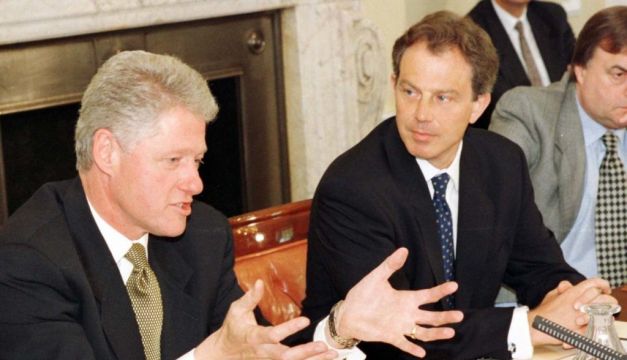Bill Clinton was “taken aback” during a phone call with Tony Blair in which he conveyed that decommissioning would not take place by the Good Friday Agreement (GFA) deadline.
The aim had been to make some progress on IRA decommissioning by February 2000 if possible, when a key Ulster Unionist council meeting was due to take place amid pressure on first minister David Trimble’s leadership.
The US-UK phone call was made a day before then Sinn Fein leader Gerry Adams met Mr Clinton at the White House, where the US President had a “circular row” with Mr Adams over the pace of disabling arsenal.
The details of the Clinton-Blair phone call made on January 11, 2000 were among newly-released Irish archive documents.
The document states that White House official Dick Norland, who would later become a US ambassador, said Mr Clinton was surprised at “the sense of alarm that Blair communicated”.
He said this was based on indications from Mr Adams and General John de Chastelain, chairman of the independent commission on decommissioning, that “not only will decommissioning not happen by the February deadline, but perhaps not even by the date indicated in the Good Friday Agreement”.
Mr Blair “expressed astonishment” that decommissioning could be used as a negotiation position and the note stated there needed to be some development for Mr de Chastelain “to report positively in the next weeks”.
Under the Good Friday Agreement, all paramilitary groups were to decommission by May 2000.
Mr Clinton agreed to do “all he could” and suggested it might be helpful if the British side were able “to achieve some visible signs of demilitarisation”.
He said that a positive reaction to the Patten report into post-GFA policing in Northern Ireland would also help; the note stated that Mr Blair “sounded as if he were willing to consider some movement on these issues”.
Mr Clinton also said he would tell Mr Adams that decommissioning did not need to be achieved by February, when the UUC meeting was to take place, but would stress that it was “a fundamental requirement of the Good Friday Agreement”.
“It needed to be shown that the agreement was achieving implementation on this front, as on others, and sooner rather than later.”
Another briefing note dated the same day recounts a meeting between the decommissioning body and British and Irish officials in Belfast, where it could not guarantee that neutralising arms would happen before February or that it would begin or end by May 22.
The briefing note said that based on a meeting held earlier in January, the IRA had not said no to decommissioning but “did not say ‘yes’ either”.
It also said that proposal to “give up arms” would be “defeated if they tried to force it on the organisation now” and the “leadership would be changed”.
The commission had informed the IRA that while the destruction of arms is required, that this included “making permanently inaccessible”, for example, removing the firing pin from a gun and setting it in concrete.
Chairman Mr de Chastelain, Finnish brigadier Tauno Nieminen and Andrew Sens made up the Independent International Commission on Decommissioning (IICD).
Mr Nieminen “does not believe that decommissioning is possible right now and cannot say that it will ever be possible”, and the IRA “came up with no new ideas”, the note stated.
Mr Sens expressed concern that the IRA “appeared to be moving the goalposts” from emphasis on political structures to “ending British presence” in Ireland.
“The IRA representative had asked if the commission was familiar with the ‘pike in the thatch’ approach and could help in finding a solution along those lines.
“De Chastelain explained to them that a missile in the thatch was an entirely different matter.
“Sens had a sense (and the others agreed) that a debate is taking place within the movement, right now, and, even if something positive is to emerge, the IRA will ‘hold its cards’ until end January.”
The British side believed that IRA and Sinn Fein “may not fully appreciate Trimble’s difficulties” while the Irish disagreed with that suggestion in relation to Sinn Fein.
It was stated that a deadline should not be set if paramilitaries did not agree to one.
The material can be viewed in the National Archives in file 2023/154/6







